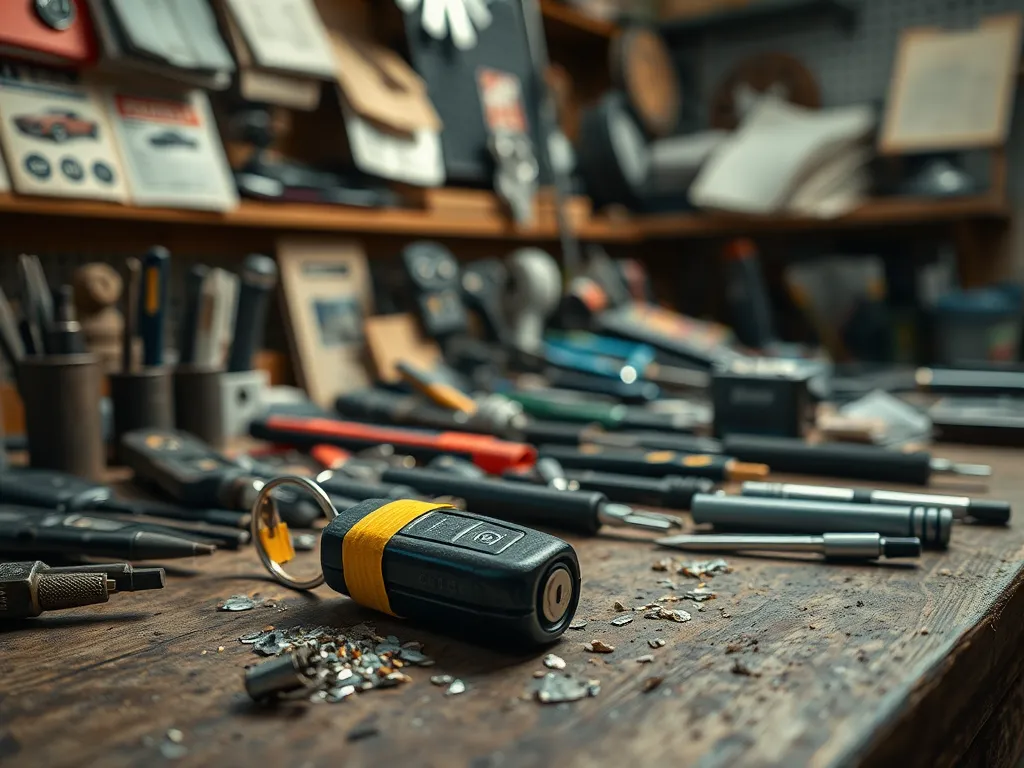Expert Broken Car Key Repair: Quick Solutions for You

Broken Car Key Repair: A Complete Guide
Broken Car Key Repair is a common issue for car owners, as keys can easily become damaged or rendered unusable due to a variety of factors. Understanding the causes of broken car keys, how to address the issue, and knowing when to seek professional help can save time and money while ensuring your vehicle remains accessible. In this guide, we explore everything you need to know about repairing a broken car key.
The need for Broken Car Key Repair often arises unexpectedly, leaving drivers frustrated and locked out of their vehicles. There are various scenarios that lead to key breakage, such as mechanical wear and tear, improper use, or environmental conditions. Knowing these causes can help you minimize the risk of key damage in the future, as well as guide you through the repair or replacement process.
When considering Broken Car Key Repair, it is essential to weigh DIY solutions against professional services. While some minor repairs can be tackled at home, certain situations may require the expertise of a locksmith or automotive professional. This article covers step-by-step techniques for DIY repairs, signs that you may need a professional, and preventative tips to increase the longevity of your keys.
Additionally, an understanding of the different types of car keys and their varying durability is crucial in preventing future breakage. With advancements in technology, smart keys have become prevalent but may come with their own set of vulnerabilities. By being informed about your car key and its specific needs, you’ll be better equipped to handle any issues that may arise.
Our team specializes in repairing damaged keys swiftly and efficiently.
In summary, Broken Car Key Repair is a pertinent topic for car owners, encompassing an array of maintenance tips, repair techniques, and preventative measures to ensure the longevity of car keys. Equipped with this knowledge, you can navigate the challenges of key breakage with confidence and ease.
Common Causes of Broken Car Keys
1. **Mechanical wear and tear effects on keys:** Over time, car keys can undergo wear and tear due to repeated usage, leading to weakening and breakage. Frequent turning in locks, pressure from key chains, and bending can deteriorate the integrity of the key material.
If you need to fix broken car keys, we can help you quickly.
2. **Improper use leading to key damage:** Using the car keys inappropriately, like forcing them into a lock or using excessive pressure can lead to bends or snaps. Misusing the key can cause unnecessary strain, resulting in damage.
3. **Environmental factors affecting key durability:** Extreme temperatures can affect the material of the key, especially for plastic or rubber components. Humidity and exposure to chemicals can also degrade the key’s physical state, contributing to breakage.
Dealing with damaged car keys is easier than you think.
4. **Key fob battery issues and their impact:** A malfunctioning key fob due to a dead battery can sometimes lead to car owners forcing the mechanical key out, resulting in damage to both the fob and the key itself. Regular maintenance of the key fob battery can prevent these issues.
DIY Broken Car Key Repair Techniques
1. **Using super glue for temporary fixes:** If your key breaks, a quick and easy temporary solution is to use super glue to reattach the pieces. Make sure to align them correctly and hold them together until the glue sets. This solution is not permanent but can buy time until you can address the issue properly.
2. **How to reshape a broken key:** If a broken key is jagged or uneven, you may be able to reshape it using some basic tools. Carefully file down any sharp edges, making sure to maintain the original shape of your key to ensure it can still function adequately when inserted.
3. **Safe methods to extract a broken key:** If a key breaks off in the ignition or door lock, there are a few methods to safely extract it. Tools like tweezers, a pair of pliers, or a specialized key extractor can help gently remove the broken piece without causing damage to the lock.
4. **Key repair kits: pros and cons:** There are various key repair kits available on the market. They can provide an all-in-one solution to fix broken keys, but it's essential to assess the quality of the kit and understand that some damages may not be repairable, necessitating replacement instead.
When to Seek Professional Repair Services
1. **Signs that DIY repairs won’t work:** If the key is severely damaged, such as being shattered or if it doesn’t work after your repair attempts, it is best to call a professional locksmith. Additionally, if the ignition mechanism seems affected, a DIY attempt may worsen the situation.
2. **Choosing the right locksmith for car keys:** When selecting a locksmith, it’s crucial to verify their credentials and experience specifically with car keys. Opt for someone who specializes in automotive locksmithing and carries positive reviews or recommendations.
3. **Cost of professional key repair services:** The cost of professional Broken Car Key Repair can vary widely based on factors like location, key type, and damage severity. It is advisable to obtain quotes from multiple locksmiths to find a fair price.
4. **Timing: When to replace vs. repair:** If repeated breakage occurs or the key is frequently malfunctioning, it may be more cost-effective to replace the key rather than continue repairs. A professional can assess the situation and provide tailored advice based on your key’s condition.
Preventative Tips for Key Longevity
1. **Best practices for handling car keys:** Always handle car keys gently, avoiding excessive bending or force. Use the key as intended, and be mindful when inserting or turning it in locks to reduce strain.
2. **Regular maintenance tips to avoid damage:** Regularly check the condition of your keys and fobs. Look for signs of wear, such as cracks in the plastic or loose parts, and replace them before they break entirely.
3. **Using key covers and protective accessories:** Consider using rubber key covers or protective cases to shield keys from physical damage and environmental factors. These accessories can absorb shock from drops and prevent scratches.
4. **Avoiding common mistakes that lead to key breakage:** Avoid using your car keys for purposes other than intended, like prying or scraping. Also, be cautious about attaching excessive weight to your keychain, which can put unwanted stress on the key.
Understanding Key Types and Their Durability
1. **Differences between traditional and smart keys:** Traditional keys are typically made of metal and are straightforward in design, while smart keys often include electronic components, making them more complex but also prone to different types of failure.
2. **Material quality: What to look for in a key:** When acquiring a car key, consider the material quality. High-grade metals, durable plastics, and wear-resistant coatings can enhance key durability and reduce the chances of breakage.
3. **Vulnerabilities of different key types:** Each key type comes with unique vulnerabilities. Traditional keys may bend easily, while smart keys can malfunction if the battery dies. Understanding these vulnerabilities helps in taking proactive steps to avoid damage.
4. **Comparative durability of different key brands:** It's also essential to note that different manufacturers may produce keys with varying durability. Always opt for keys from reputable brands known for quality craftsmanship to minimize issues down the line.
